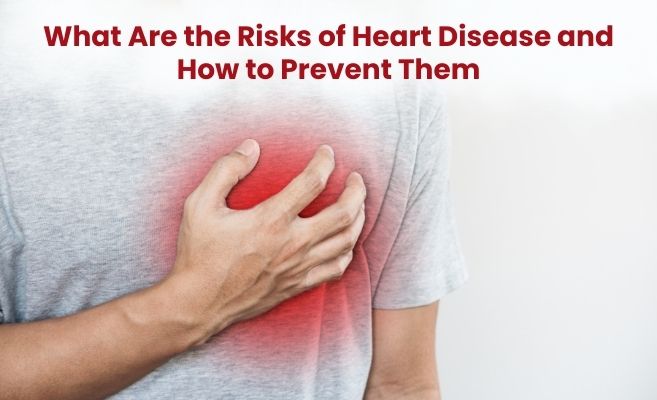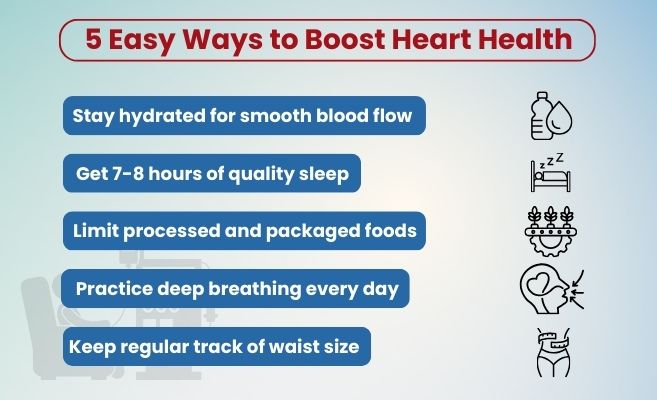World Heart Day 2025: Cardiovascular Diseases Risk Factors & Preventions

Every minute, four Indians suffer a heart attack and sadly, one in four does not survive, says the ICMR-NCDIR 2024 report. That’s why, before World Heart Day 2025 on 29 September, we’ve put together this simple guide for you. This year’s theme, ‘Use Heart, Know Heart,’ reminds us to understand our risks and take small steps early to protect our hearts.
Heart disease can make daily life challenging. You may feel tired climbing stairs, short of breath while walking or struggle to sleep well at night. It can also affect your mood, reduce your energy for work and family activities and even make simple things like cooking, shopping or playing with your kids more difficult. Over time, these small struggles add up and reduce your overall quality of life.
This quick guide by our specialists on risk factors and preventions will show you what works best for your health and lifestyle.
In this guide, our specialists share easy tips to understand heart risks and ways to prevent them, so you know what truly helps your health every day.
Why World Heart Day 2025 Matters in India
Heart disease is India’s biggest health threat. It accounts for nearly 24% of all global CVD deaths and shockingly, 54% of Indians who die of heart problems are under 70 years old.
Recent hospital data shows a 13% rise in heart attacks among adults younger than 45 since 2020. This means younger working professionals, who often ignore symptoms, are increasingly at risk.
At PSRI Hospital, our cardiology team is committed to reducing premature heart deaths with early diagnosis, advanced technology and evidence-based treatments. By spreading awareness on World Heart Day 2025, we aim to help more people recognise warning signs early and take steps to protect their heart health.
What Counts as Cardiovascular Disease?
Cardiovascular disease includes several common but serious conditions:
- Coronary artery disease: Blocked heart arteries reduce blood flow, often leading to chest pain or heart attacks.
- Stroke: When blood supply to the brain is cut off, causing sudden weakness, speech trouble or vision loss.
- Heart failure: The heart weakens and cannot pump blood well, leading to swelling, fatigue and breathlessness.
- Arrhythmias (AF, VT): Irregular heartbeats that may cause palpitations, dizziness or fainting.

Atherosclerosis (artery narrowing) is silent. Symptoms like angina may only appear once an artery is 70% blocked. For many, the first sign is a heart attack.
Heart Diseases Risk Factors You Cannot Change
Some heart risks are beyond your control, but knowing them helps you act early with the right care from a heart doctor near me.
- Age: Risk of heart disease doubles with every decade after 40.
- Family history: If a close relative (parent, sibling) had an early heart problem, your risk is about 2-3 times higher.
- Sex Hormones & genetics: Women’s risk rises after menopause. South Asians, including many Indians, are more prone to diabetes and belly fat, which adds to heart risk.
Heart Disease Risk Factors You Can Change
The good news is that many heart risks are under your control. With the right habits and timely help from the best hospital in Delhi you can lower these risks.
Lifestyle Triggers
- Inactivity: Over half of urban Indians (54%) don’t meet WHO’s activity targets. Long sitting hours and lack of exercise increase heart strain.
- Unhealthy diet: High salt, sugar, refined carbs and trans-fats raise blood pressure and cholesterol. WHO recommends keeping salt intake below 5 grams a day.
- Tobacco & alcohol: India has 267 million tobacco users and heavy drinking at once sharply raises heart risks. Quitting makes a big difference.
Metabolic & Clinical Drivers
- High blood pressure (hypertension): Affects 29% of Indian adults, but only about 12% have it under control.
- Diabetes & prediabetes: India has 101 million people with diabetes and 136 million with prediabetes, a major driver of heart disease.
- Cholesterol & obesity: Raised LDL (‘bad cholesterol’), excess belly fat and conditions like sleep apnoea (snoring with poor sleep) further increases risk.
Psychosocial Pressures
- Stress & sleep: Chronic stress, poor-quality or short sleep (urban Indians average just 6 hours 10 minutes a night) and social isolation all worsen heart health. Simple ‘sleep hygiene’ and stress management can protect the heart.
Proven Ways to Prevent Heart Diseases in 2025
Taking care of your heart does not always require big changes. What matters most are small, steady habits that you can follow every day. PSRI cardiologists suggest these simple steps:
Move More
Try to walk fast for at least 30 minutes, five days a week. Add two sessions of light strength exercises such as squats, push-ups or using resistance bands. This keeps both your muscles and heart strong.
Eat Smart
Fill your plate with fruits, vegetables, whole grains, nuts and lean proteins. This is similar to the DASH or Mediterranean style of eating. Keep your salt intake below five grams a day, which is about one teaspoon. Avoid excess sugar, fried food and foods with trans fats. Aim to keep your LDL or ‘bad’ cholesterol under 100 mg/dL.
Sleep and Stress
Good quality sleep of seven to eight hours and keeping stress under control are very important. Poor sleep or constant stress can increase blood pressure and blood sugar. Relaxation, yoga or mindfulness can help.
Quit Tobacco and Limit Alcohol
Stopping tobacco and reducing alcohol intake lowers your heart risk at any age. It is never too late to begin.
How PSRI Keeps Your Heart Safe
At PSRI Hospital, our heart team combines advanced technology with complete care so patients get the best outcomes.
- Advanced Cath Labs: We use the Clarity Platform FD 10, Prucka 2-D EP system and 128-channel CARTO 3 mapping. These allow high-precision treatments with lower radiation, giving safer and more accurate results.
- Cardiac Imaging: On-site cardiac CT and MRI scans make it possible to detect blockages and measure heart function without surgery. This helps diagnose problems early.
- Cardiac Rehabilitation: After a heart procedure, recovery does not stop at discharge. Our rehab program includes supervised exercise, diet guidance and lifestyle coaching to help patients regain strength and confidence.
One of our patients joined our rehab plan and, within months, lowered LDL cholesterol and reversed pre-diabetes, showing how the right support can transform health.
Book Your Appointment with a Heart Specialist at PSRI Hospital!
Most heart attacks are preventable when you control the risks you can change. This World Heart Day 2025, take a simple first step. For expert guidance from a heart specialist near me, choose PSRI.
Every year, our experts perform more than 500 successful heart surgeries, giving patients safe and reliable results. We offer a full range of heart services including ECG, 2D Echo, 3D Echo, angiography, cardiac MRI, CT scans, stress tests, angioplasty, bypass surgery and valve replacements.
Located in Delhi, PSRI Hospital makes advanced care easy to access for patients across the city. With experienced doctors, modern facilities and personalised care, we help you stay one step ahead of heart disease.
Want clear, expert advice on your heart health?
- Book Appointment: appointment.psrihospital.com
- Heart Services: PSRI Institute of Cardiac Sciences
- Health Check Packages: Preventive Health Check-ups
FAQ’s
Q1. At what age should healthy adults begin annual heart screenings?
Ans. From age 40, check blood pressure, sugar, cholesterol yearly, earlier if family history, diabetes, smoking, obesity or symptoms, chest pain.
Q2. How soon after quitting smoking does cardiac risk drop?
Ans. Within weeks, heart rate and circulation improve; within one year, heart attack risk halves versus smokers; keep abstinent for protection.
Q3. Is one teaspoon of ghee per day heart-safe?
Ans. One teaspoon daily is usually okay within total fat limits; prioritize unsaturated oils, vegetables, fibre, exercise and regular cholesterol checks.
Q4. What is a coronary calcium-score CT and who needs it?
Ans. A quick, low-radiation CT measuring artery calcium; helpful for adults 40–70 with intermediate risk to refine statin, prevention decisions plans.
Q5. Do smart-watch ECG apps reliably detect arrhythmias?
Ans. They can flag atrial fibrillation, but miss other issues and produce false alarms; confirm findings with ECG and specialist review.

 Book An Appointment
Book An Appointment Virtual Consultation
Virtual Consultation





